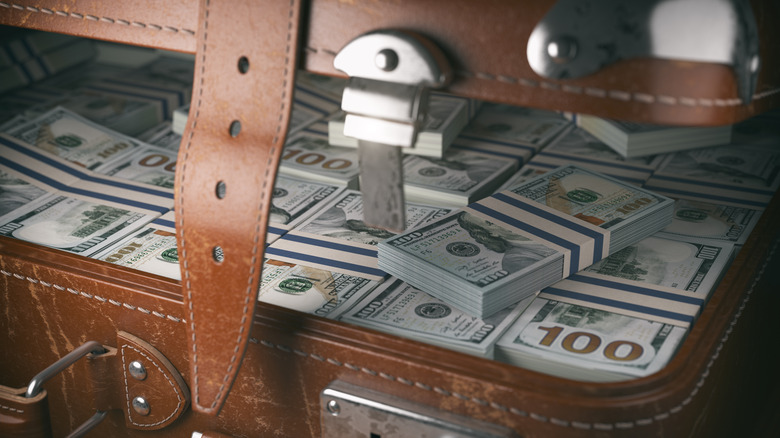What Happens To Illegal Money Seized By Police?
Here's a scenario straight from a crime drama: Some cops swarm the house of a known drug dealer, bust down the door, and the dealer looks up in shock from his sofa, cell phone in hand. He's got a stash of illegal drugs somewhere on the premises that the cops discover. The cops take the dealer away in handcuffs, give him the whole Miranda rights spiel, and he stares blankly out of the window of the cop car as the car rolls away. What happens to his drug stash? Do the cops just take it and keep it, eventually destroy it, or hand it over to someone else? And how about items the dealer used to commit his crimes, like his phone? And what about the money he got from buyers?
All of these kinds of questions fall under the umbrella of "asset forfeiture" laws, as in, "You're forfeiting your stuff to the authorities." Forfeiture laws are immensely complex, and we can only begin to cover the topic within the scope of this article. But in the end, as the United States Department of Justice explains, there are three types of forfeitures: criminal, civil, and administrative. Each relates to a different legal process, and each has its own rules. And of course, every country in the world has its own set of forfeiture laws. Many people, however, take issue with such laws, even calling them "legalized theft," as the Leadership Conference on Civil and Human Rights puts it.
Straight to the agencies involved
Forfeiture laws have evolved quite a bit over time, all the way to the present and in response to shifting needs and priorities within realms of jurisprudence, as sites like the Cornell Legal Information Institute outline. In general, as the U.S. Department of Justice explains, any money seized by authorities goes straight to the authorities themselves. It's shared between federal, state, and local agencies "if they were involved in the enforcement action." This is especially true in the case of money related to illegal drug trade, as forfeiture laws really took firmer shape during the U.S.' informal "war on drugs" in the 1980s. In 1984, the Comprehensive Drug Abuse Prevention and Control Act was amended to allow money from civil forfeitures to go straight into the U.S. Treasury's General Fund. In 1986 this ability was expanded yet again to allow money to pass directly to law enforcement agencies.
And what do various government and law enforcement agencies do with the money they've received? That's a bit vaguer. In general, as the U.S. Department of Justice states, most jurisdictions use "proceeds from forfeitures" to pay for "forfeiture expenses" — 83% of jurisdictions, in fact. In other words, those agencies use the money for equally vague "law enforcement purposes." A much smaller amount — 20% — uses the money for non-punitive purposes like "drug treatment or prevention," despite this approach being much more successful in stunting the growth of illegal drug trade and use.
Criminal vs. civil forfeiture
You might be thinking, "Hold on, can the police just take my money and property even if I haven't done anything wrong?" The answer — and it's not one you'd hope to hear — is "yes." That is, provided courts can ultimately prove that "the property was linked to criminal activity" (per U.S. Department of Justice). This is civil forfeiture in a nutshell, rather than criminal or administrative forfeiture, and explains why many folks decry civil forfeiture as unjust, as Forbes explains. Take Nassir Geiger, who was found with "empty ziplock bags" in his car. Cops in Philadelphia up and took his car and the $580 cash he had on him. There were no drugs, and not even drug residue, found. After numerous hearings, he was charged $1,800 for authorities storing his car while things played out.
As infuriating and absurd as this scenario sounds, it's not uncommon. As the U.S. Department of Justice explains, the seizure of goods and money comes down to the difference between criminal and civil forfeiture. Criminal forfeiture targets a person and a specific sum of money, while civil forfeiture targets the property used to commit a crime — the stuff itself. This "allows the government to file cases against property that would not be reachable through criminal forfeiture." It also allows that reach to grab and fill coffers, justly or not. Organizations like Leadership Conference on Civil and Human Rights have addressed such issues for years, and they're not likely to be resolved any time soon.


